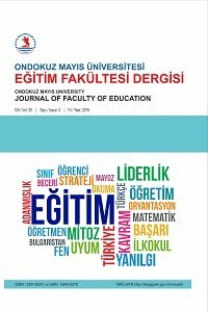Öğretmen Adaylarının Bilimsel Epistemolojik İnançlarının İncelenmesi
Bu arastırmada, üniversite öğrencilerinin epistemolojik inançları bazı değiskenler (cinsiyet, bölüm, sınıf düzeyi, lise türü, sınıf tekrar etme) açısından incelenmistir. Arastırma iliskisel tarama modelindedir. Çalısma grubu, Marmara Üniversitesi Teknik Eğitim Fakültesi’nde okumakta olan 651 öğrenciden olusmaktadır. Çalısma grubu bu fakültede bulunan bölümlerdeki 1. ve 4. sınıflardan tesadüfi örnekleme yoluyla seçilmistir. Arastırmada veri toplama aracı olarak, Pomeroy (1993) tarafından gelistirilen ve Deryakulu ve Bıkmaz (2003) tarafından Türkçe’ye uyarlanan “Bilimsel Epistemolojik Đnançlar Ölçeği” kullanılmıstır. Verilerin çözümlenmesinde bilimsel epistemolojik inanç düzeylerinin belirlenmesi için standart sapma değerleri kullanılmıstır. Arastırmada verilerin analizinde Mann Whitney U testi ve Kruskal-Wallis testi kullanılmıstır.
An Investigation of Student-Teachers’ Scientific Epistemological Belief
In this research, university students’ epistemological beliefs were studied according to some variables (sex, department, class level, high school type, repeating a grade level). Research is in correlative survey model. The The study includes a sample of 651 university students from the Technical Education Faculty in Marmara University. During the sampling procedure, freshmen and senior students in this faculty were chosen by random sampling method. “Scientific Epistemological Beliefs Survey” developed by Pomeroy (1993) and adapted in Turkish by Deryakulu and Bıkmaz (2003) was used to collect data. In order to determine the scientific epistemological belief level, standart deviation was used. In the research, to analyze the data, Mann Whitney U and Kruskal-Wallis tests were applied.
___
- Bernardo, A. B. I. (2008). Exploring epistemological beliefs of bilingual Filipino preservice teachers. The Journal of Psychology. 142 (2), 193-208.
- Brownlee, J. Tickle, E. L.,&Nailon, D. (2004). Epistemological beliefs and transformational-transactional leadership behaviours of directors in child care centres. Educating: Weaving Research into Practice. 1,153-166.
- Brownlee, J. M. Thorpe, K. J.,& Stacey, P. S. (2005). Improving learning and teaching in early childhood teacher education: A focus on personal epistemology. In Proceedings Higher Education Research and Development Society of Australasia, Sydney.
- Brownlee, J. (2001). Beliefs about knowing in pre-service teacher education students. Ed: L. Richardson & J. Lidstone (Eds), Flexible Learning for a Flexible Society, 75-82.
- Buehl, M. (2003). At the Crossroads of Epistemology and Motivation: Modeling the Relations between Students' Domain-Specific Epistemological Beliefs, Achievement Motivation, and Task Performance. Yayınlanmamıs doktora tezi. Maryland Üniversitesi. Amerika.
- Chan, K. (2003). Hong Kong teacher education students' epistemological beliefs and approaches to learning. Research in Education, 69, 36-50.
- Deryakulu, D. ve Bıkmaz, H. F. (2003). Bilimsel epistemolojik inançlar ölçeğinin geçerlik ve güvenirlik çalısması. Eğitim Bilimleri ve Uygulama, 4, 243-257.
- Dahl, T. I., Bals, M. and Turi, A. N. (2005). Are students’ beliefs about knowledge and learning associated with their reported use of learning strategies? British Journal of Educational Psychology, 75, 257273.
- Erdem, M. Yılmaz, A. Akkoyunlu, B. (2008). Öğretmen Adaylarının Bilgi Okuryazarlık Özyeterlik Đnançları Ve Epistemolojik Đnançları Üzerine Bir Çalısma. Educational Technology Conference (IECT), Eskisehir, Anadolu Üniversitesi.
- Eroğlu, S. E. Güven, K. (2006). Üniversite Öğrencilerinin epistemolojik Đnançlarının Bazı Değiskenler Açısından İncelenmesi. Çukurova Sosyal Bilimler Enstitüsü Dergisi, Selçuk Üniversitesi Sosyal Bilimler Enstitüsü Dergisi, 16, 295-313.
- Helge I. Strømsø, H. I. Bråten, I. (2003). Epistemological Beliefs and Implicit Theories of Intelligence Among Norwegian Post-Secondary Students. 10th European Conference for Research on Learning and Instruction, Padova, Italy. Retrieved September 25, from http://folk.uio.no/helgestr/SRLTC/EpistPadova.doc in the Filipino and english languages. The Journal of Psychology. 142 (2), 193-208
- Liu S. Lee, L. Tsai, C. 2007 . Scientific epistemological view and decision-making on socioscientific ıssues. Chineese Journal of Science Education, 15(3),335 – 356.
- Marrs, H. (2005). Culture, Epistemology And Academic Studying. Doktora tezi. Kansas State Üniversitesi, Kansas.Retrieved August 11, from http://209.85.135.104/search?q=cache:yZ8yAraGP-sJ:krex.kstate. edu/dspace/bitstream/2097/84/1/HeathMarrs.pdf+%22epistemological+belief%22+%22academic+ach ievement%22+%22experimental%22&hl=tr&ct=clnk&cd=22&gl=tr
- Pena A, Paco O, Peralta C. (2002). Epistemological beliefs and knowledge among physicians: A questionnaire survey. Medical Education Online, 7(4), 1-9.
- Schommer-Aikins, M. Hutter, R. (2002). Epistemological beliefs and thinking about everyday controversial issues. The Journal of Psychology 136 (1), 5-15.
- Terzi, A. R. (2005). Üniversite öğrencilerinin bilimsel epistemolojik inançları üzerine bir arastırma. Afyon Kocatepe Üniversitesi Sosyal Bilimler Enstitüsü Dergisi. 7 (2). 298-311. [10 Ağustos 2008] http://www.sosbil.aku.edu.tr/dergi/c7s2.htm
- Tove, D. Bals, M. Turi, A. L. (2005). Are students' beliefs about knowledge and learning associated with their reported use of learning strategies? British Journal of Educational Psychology 75 (2), 257-273.
- Tsai, C. (2006). Biological knowledge is more tentative than physics knowledge: Taiwan high school adolescents' views about the nature of biology and physics. Adolescence. 1-8. Retrieved September 15, from http://findarticles.com/p/articles/mi_m2248/is_164_41/ai_n17094452/pg_1
- Tüzün Ö. Y. Topçu, M. S. (2007). Relationships among preservice science teachers' epistemological beliefs, epistemological world views, and self-efficacy beliefs. International Journal of Science Education,. 30 (1), 65-85.
- ISSN: 1300-302X
- Yayın Aralığı: Yılda 2 Sayı
- Başlangıç: 1986
- Yayıncı: Ondokuz Mayıs Üniversitesi Eğitim Fakültesi
Sayıdaki Diğer Makaleler
Biyoloji Öğretimi İçin Hazırlanmış Eğlenceli Eğitim Yazılımı Değerlendirmesi
Edebiyat Öğretiminde Görsel Araç Kullanımı: Kısa Öykü Örneği
Didem İNAL, Ali Günay BALIM, Teoman KESERCİOĞLU, Ertuğ EVREKLİ
Öğretmen Adaylarının Bilimsel Epistemolojik İnançlarının İncelenmesi
İlköğretim 7. Sınıf Öğrencilerinin Medya ve Medya Okuryazarlığı Dersine İlişkin Tutumları
Özcan PALAVAN, Şakir ÇINKIR, Elif MERCAN, Alper KESTEN, Cevat ELMA, Abdullah Nuri DİCLE
